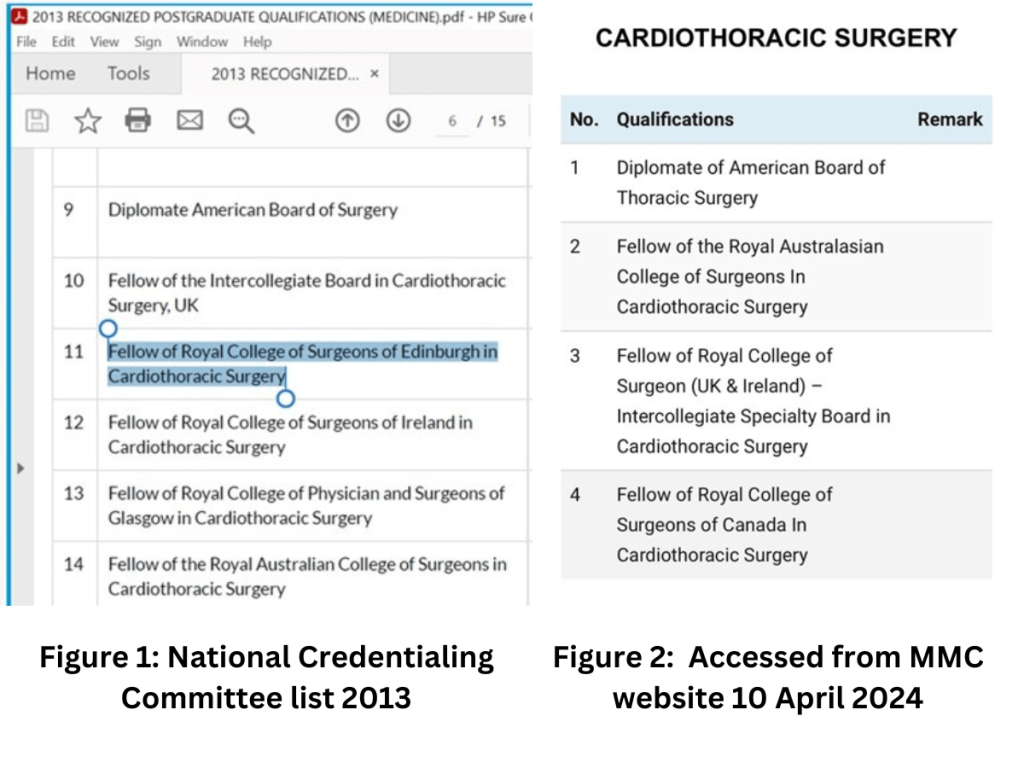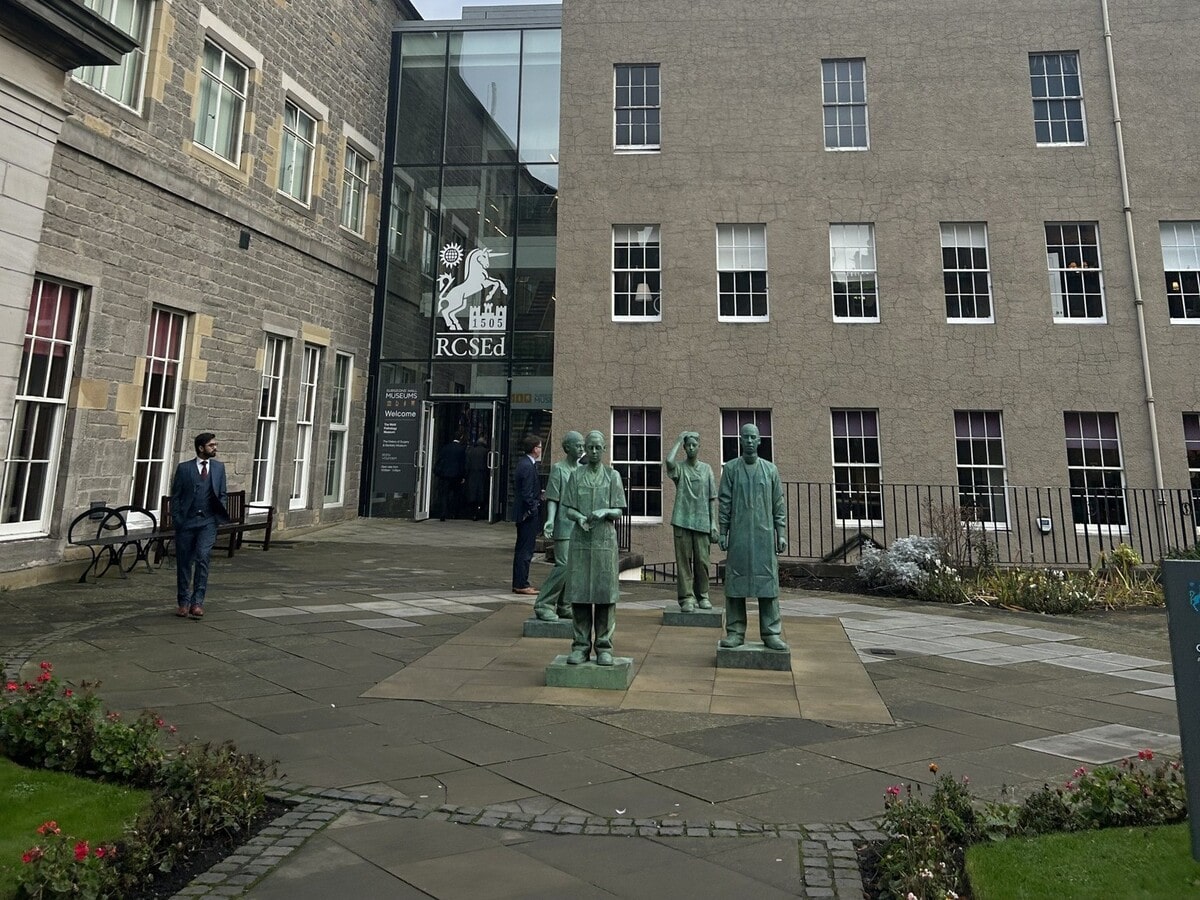This article is a continuation of MMC, Heal Thyself (Part 1).
Cardiothoracic Surgery
Cardiothoracic surgery was a subspecialty until about a decade or so ago. On April 5, 2012, the Malaysian Association of Thoracic and Cardiovascular Surgery (MATCVS) established a specialist sub-committee (SSC) for the specialty.
On February 28, 2018, a Memorandum of Understanding (MoU) was signed by Prof Rosmawati Mohamed, master of the Academy of Medicine of Malaysia (AMM); Prof Raja Amin Raja Mokhtar, MATCVS president; and Timothy Graham, chairman of professional standards at the Royal College of Surgeons of Edinburgh (RCSEd).
The witnesses were Dr Noor Hisham Abdullah, Health director-general and Dr Yahya Awang, chairman of the Malaysian Board of Cardiothoracic Surgery (MBCTS).
The MoU formalised the role of RCSEd in the training of cardiothoracic surgeons in Malaysia, i.e. it will accredit suitable centres in Malaysia to deliver training in cardiothoracic surgery, recommend the number of training positions within each training centre, and quality assure the Fellowship Training Programme of the MBCTS.
On September 15, 2018, an MoU was signed in Hong Kong by Prof Michael Lavelle-Jones, president of the RCSEd; Prof Hanafiah Harunarashid, president of the College of Surgeons, AMM; Prof Paul Lai, president of the College of Surgeons of Hong Kong; Prof Raja Amin Raja Mokhtar; and Dr S Sayampanathan and Assoc Prof Chen Fun Gee, co-chairmen of the Joint Committee of Specialist Training of Singapore, thus establishing a Quadripartite Exit Examination in Cardiothoracic Surgery involving the four parties.
The witnesses were Prof John Chan Kok Meng, MATCVS and MBCTS secretary; Prof Malcolm Underwood, chairman of the Cardiothoracic Examination Board of Hong Kong; and Timothy Graham. The Malaysian Ministry of Health (MOH) endorsed these arrangements.
Pursuant to the 2018 agreement above, Malaysian trainees in the Cardiothoracic Parallel Pathway training took the RCS Ed Joint Specialty Fellowship (JSF) examination in 2022.
This qualification has been the only exit examination in Hong Kong and Singapore for more than two decades.
In his letter to the health minister, the president of the RCSEd provided a detailed chronology and explanation of the FRCSEd training and examination in Cardiothoracic Surgery in the parallel pathway.
“The exit examination for the Cardiothoracic Parallel Pathway Training is the RCSEd Joint Specialty Fellowship (JSF) Examination in Cardiothoracic Surgery. Please note that this is a different exam to the Joint Surgical Colleges Fellowship Examination (JSCFE), which is run by the Joint Committee on Intercollegiate Examinations (JCIE)…
“The RCSEd JSF exam is a summative exit qualification at the end of a quality assured training programme with a curriculum, annual progression points and assessments, and formative work-based assessments to ensure technical competence, all done to the standard of the UK National Training Programme in Cardiothoracic Surgery and quality assured by RCSEd…
“Graduates from the Cardiothoracic Parallel Pathway training with this qualification are eligible to apply for Specialist Registration as Cardiothoracic Surgeons in the UK through the Portfolio Pathway.”
More Than Confusion
The Malaysian Medical Council’s (MMC) refusal to place on its National Specialist Register (NSR) doctors who took the Cardiothoracic parallel pathway and passed the FRCSEd Cardiothoracic examination led to not only confusion, but also international impacts.
In general, the communications of professional organisations are done privately. However, the letter from the president of the RCSEd to the Malaysian health minister was published by a health news portal, CodeBlue. Diplomats from the United Kingdom and Ireland called on the same minister to discuss the matter.
There was international embarrassment for Malaysia when the MOH cannot even recognise an arrangement that it was party to. Not only that, the other Royal Colleges in the UK, Ireland, and Australasia would have taken cognisance of the MMC’s action with possible ramifications for any future collaboration and co-operation.
The media response was also uncomplimentary, with the question raised of whether the MMC had gone rogue.
There is confusion among cardiothoracic trainees in the FRCSEd parallel pathway, and this has been aggravated by instructions from their superiors to apply for transfer to a provisionally accredited cardiothoracic programme of a specific local university.
It is pertinent to be aware that the accreditation of a programme is not the same as the recognition of a qualification, and that provisional accreditation is not the same as full accreditation, which is the prelude to consideration for the recognition of a qualification.
The primary issue is whether the FRCSEd Cardiothoracic qualification is recognised by the MMC.
The statement by the president of the MMC that “the MMC denies that the Fellow of Royal College of Surgeons of Edinburgh (RCSEd) in Cardiothoracic Surgery was at any time recognised by the MMC” was factually inaccurate.
If this is the case, how could it then account for the fact that there are 19 specialists with the FRCSEd qualification and another nine specialists with the FRCSEd Cardiothoracic qualification in the MMC’s NSR for cardiothoracic surgery?
Not only that, the NSR’s current list of acceptable cardiothoracic surgery qualifications includes Fellow of Royal College of Surgeon (UK & Ireland) – Intercollegiate Specialty Board in Cardiothoracic Surgery (Figure 1) (Accessed 10 April 2024). There is no FRCS (UK) but there is FRCSEd, FRCS England, and FRCS Glasgow.
What then was the rationale for the action taken by the MMC to withhold recognition of a qualification that it had previously recognised, and continues to recognise?
Despite extensive print and electronic media coverage, the MMC has not responded. Indeed, its silence has been deafening.
Some of the possibilities for this quagmire are discussed below. It is obvious there are more questions than answers.
Was the non-recognition due to issues about the quality of the training, examinations, and/ or any other aspects of the FRCSEd Cardiothoracic in the parallel pathway?
If so, what were the deficiencies, if any, and were these communicated to the RCSEd, their partners in Malaysia, Singapore, and Hong Kong, and also the trainees? If not, why not?

Or was the non-recognition of the FRCS Cardiothoracic qualification in the parallel pathway due to the different terminologies in the NSR list?
The cardiothoracic surgery qualification listed in the NCC list, which the MMC adopted, was “Fellow of Royal College of Surgeons of Edinburgh in Cardiothoracic Surgery, which is the correct one (Figure 1), unlike the current one in the MMC website i.e. Fellow of Royal College of Surgeon (UK & Ireland) – Intercollegiate Specialty Board in Cardiothoracic Surgery (Figure 2).
Can an applicant be penalised for a clerical error which the MMC is responsible for?
It is difficult to fathom how a clerical error could have been missed, if there was due process in the consideration of applications, i.e. assessment and recommendation by the SSC, recommendation by the Evaluation Committee, and decision by the MMC.
The members of the SSC, Evaluation Committee, and MMC comprise senior doctors, some of whom are surgeons and cardiothoracic surgeons (in the SSC).
Even if no surgeon, in particular a cardiothoracic surgeon, was present at a particular meeting, did the MMC secretariat confirm with MMC what FRCS (UK) meant?
Or was the non-recognition of the FRCSEd Cardiothoracic qualification in the parallel pathway part of an attempt to derail the parallel pathway for specialty training?
And was cardiothoracic surgery an early domino because the numbers were small? Or was the non-recognition the initial part of a plan by certain quarters to take control of specialty training in Malaysia?
Surely the MMC could not have been unaware that it is public policy to address the shortage of specialists in general, and cardiothoracic surgeons in particular, which the local universities have been unable to do so since the inception of the Master’s programmes in the 1980s, and that the parallel pathway was implemented to help address the specialist shortage.
The closure of the pathway for specialty registration for those with qualifications not in the MMC’s NSR list is unfathomable. What was the rationale?
Is the MMC’s message to Malaysian specialists with these qualifications that the country does not require their services, when the country is short of specialists?
Is the MMC’s decision in accordance with public policy? It would be sheer myopia to take the position that the MMC’s NSR list is exhaustive.
Surely the MMC could not have been unaware of the High Court ruling in Asia Pacific Higher Learning Sdn Bhd vs MMC Anor [2019] regarding changes in guidelines. Justice Azizul Azmi Adnan stated then:
“67. Once an authority has given guidance on how it will exercise its power and discretion under law, there will be imposed on that authority a duty to adhere to those guidelines…
“68. In this case, the MMC had issued the Accreditation Guidelines setting out the requirements for accreditation and the procedures to be followed in an application for accreditation. It will be open to the MMC to make modifications to the process from time to time, and such changes to the guidelines ought to be communicated to potential applicants (which in this case would be institutions of higher learning proposing to offer medical degree courses in Malaysia)…” (emphasis added)
The above case was in relation to an accreditation issue. However, it would be very difficult to argue that the principles regarding the MMC’s duty to adhere to guidelines and to communicate changes to the guidelines to those affected are not applicable to primary and specialty registration with the MMC.
The question arises as to when the MMC changed its guidelines on specialty registration for those with qualifications not in the MMC’s NSR list, and whether and when this was displayed on the MMC website.
Another pertinent issue is whether applicants were informed by the MMC of its refusal to register their specialty qualifications and the reasons for the refusal, as required by section 14C of the Act which states:
(3) The Council may refuse to register any such person as it thinks fit.
(4) Where the Council refuses to register the applicant under subsection (3), the Council shall immediately serve a notice of refusal to the applicant together with the reasons thereof. (emphasis added)
MMC, Heal Thyself
In all the years that I served in the MMC as an elected member, I have never come across an issuance of a factually inaccurate press statement regarding qualification for registration.
There has been much media publicity about MMC in the past month. What has this done to its image?
The MMC has taken a sharp turn towards an abysmal situation with its non-recognition of the FRCSEd Cardiothoracic qualification in the parallel pathway, and the closure of the pathway for specialty registration for those with qualifications that are not in the MMC’s NSR list.
It is time that the MMC reverse gear and attempt to regain the trust of the medical profession and the public by:
- Correcting decisions devoid of cogent rationale.
- Establishing an independent external inquiry into the current imbroglio.
- Adhering strictly to the best practices of a health care regulator, which include:
- Integrity: Being honest and sharing; listening to stakeholders but remaining independent in decision making and administration.
- Collaboration with all stakeholders to support safe, high-quality care.
- Fairness: Respect for people and treating them without prejudice.
- Transparency: Openness and accountability for MMC’s actions and inactions,
- Consistency in decision making and administration,
MMC, heal thyself.

Dr Milton Lum is a Past President of the Federation of Private Medical Associations, Malaysia and the Malaysian Medical Association. The views expressed do not represent that of any organisation the writer is or was associated with. No responsibility is assumed by the writer for any injury and/ or damage to persons or property in respect of anything or the consequences of anything done or omitted to be done by anyone in reliance, whether wholly or partial, upon the whole or any part of the contents of this article. If legal advice is required, the services of a legal counsel versed in medical law should be sought.
- This is the personal opinion of the writer or publication and does not necessarily represent the views of CodeBlue.








